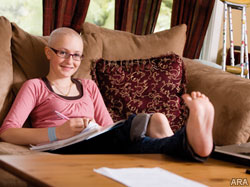(ARA) – As frightening as a cancer diagnosis is for any adult, it can be infinitely more terrifying for parents hearing the dreaded diagnosis applied to their child’s illness. Parents of children with cancer not only must make daunting medical decisions on their child’s behalf, they also face the challenge of helping their child cope with the emotional impact and physical side effects of cancer treatment.
While innovations in cancer treatment mean many children who are diagnosed with cancer will go on to lead long, full lives, the life-saving treatments can be painful and cause stressful side effects, such as chemotherapy-induced nausea, weakness and hair loss. It’s important for parents to help children deal with these side effects both physically and emotionally.
Emotional side effects
From the stress of having a chronic illness to physical and emotional isolation from their friends, cancer and cancer treatment affect children on a deeply emotional level. Children seek guidance on how to cope with their own feelings, and how to talk to their friends about their illness. Online resources like kidshealth.org can offer parents a wealth of information and good advice.
Cosmetic side effects of chemotherapy can be particularly stressful for some children. Hair loss, a common side effect, is an outward sign that a child is sick and he or she may feel very self-concious about it. Parents should reassure children that their hair will grow back when their treatment is over, and discuss options for the meantime, including wigs, hats, or even shaving their head before the hair falls out.
Parents should be sure to seek help for their children in dealing with emotional issues related to cancer. Physicians, nurses, psychologists and clergy can all be resources for families.
Physical side effects
Cancer treatment can cause numerous physical side effects, including nausea and vomiting, fatigue, nutrition and eating problems, fever, skin changes and even confusion and memory problems, according to The National Cancer Institute.
Cancer nausea and vomiting are among the most common side effects, and can be particularly troubling for children, who may already be suffering nutritionally from a lack of appetite. While some medications can effectively treat nausea, parents may hesitate to add yet another drug to the combination their child is already receiving.
Acupressure is proving helpful in relieving nausea and vomiting for children undergoing cancer treatment. A study of children undergoing cancer treatment at Brenner Children’s Hospital in Winston-Salem, N.C. indicated that acupressure provided by the Sea-Band brand wristband helped reduce nausea and vomiting among the children, ages 5 to 19, who participated in the study. A plastic stud inside the wrist band places mild pressure on an acupressure point that is associated with relieving nausea and vomiting.
The Brenner study notes that “in general, acupressure was safe and well-received, and the patients believed it to be efficacious …” The study authors also called for more research into the use of acupressure to prevent chemotherapy-related nausea and vomiting in children.
“Sea-Band wristbands can give patients a sense of control, and they are simple enough for children to use effectively,” says Leonard Nihan, president of Sea-Band Ltd. “When patients feel in control of their symptoms, they spend less time in the hospital during therapy.” The FDA-approved bands are reusable and available in drugstores everywhere. Log on to www.sea-band.com to learn more.

